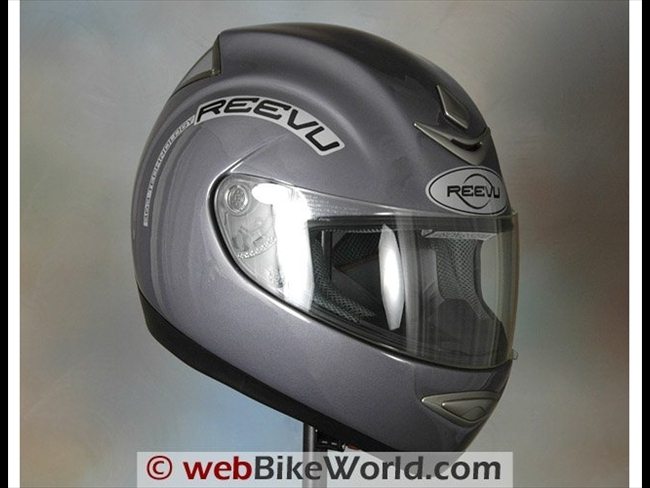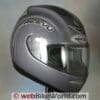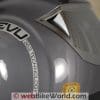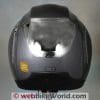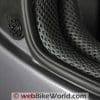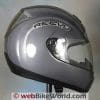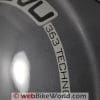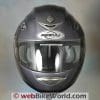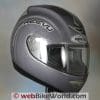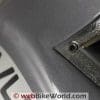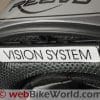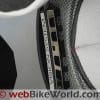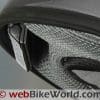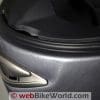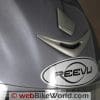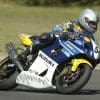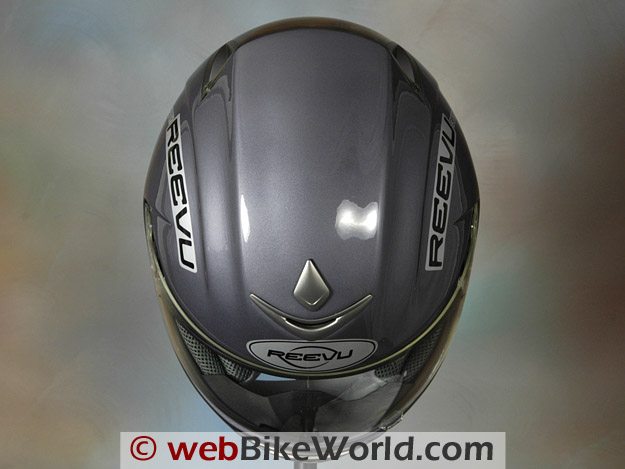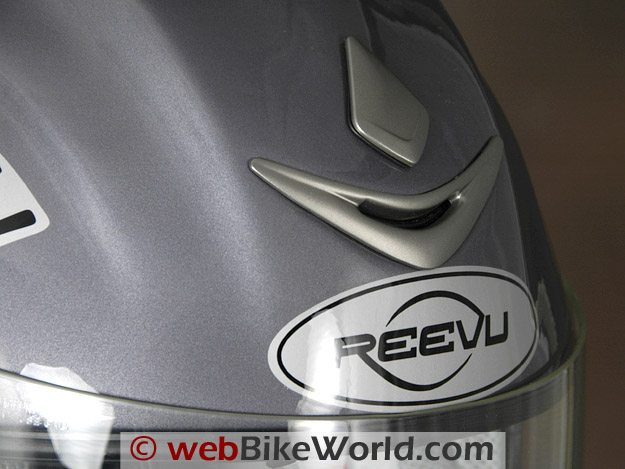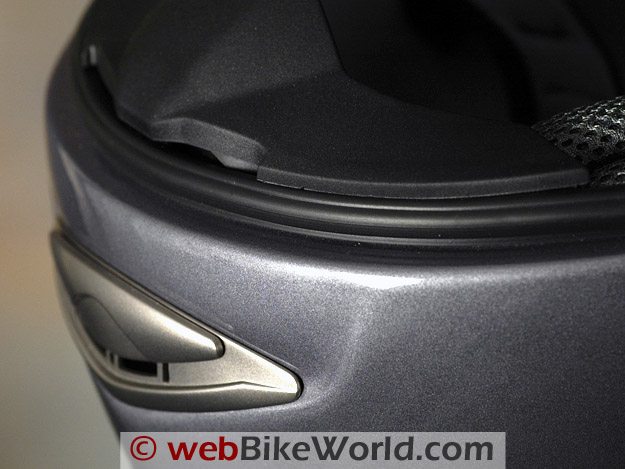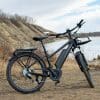The Reevu MSX1 is the fist motorcycle helmet with a rear view mirror system!
This is an amazing development in motorcycle helmets and it’s obviously an excellent safety feature.
But the helmet is also good enough to stand on its own even if it didn’t have the rear view system, because the MSX1 is beautifully finished with exceptional quality.
NOTE: See the webBikeWorld produced video of the Reevu MSX1 (below) on TechToys 360Episode 2!
We were honored to publish the first review of the Reevu MSX1 rear view mirror motorcycle helmet back in 2005.
We actually had a prototype of the MSX1 delivered in 2004, but it had to be returned to the company and it wasn’t until almost one year later that we were allowed to publish the story.
The MSX1 was a remarkable development and the feedback we gave Reevu was about the front part of the rear view mirror system, which was non-adjustable.
They promised to work on it and get back to us — obviously, we were excited and couldn’t wait to see the concept fully developed.
But, for several reasons, the helmet never made it into full production and the company faded into the background.
At one point, even their website was not accessible. So, life went on until suddenly in 2009 we received a message from Reevu: the MSX1 was a go!
They sent us a brand new, 2010 version of the MSX1 a few weeks ago, and it looks very similar to the original from the outside.
The internals have all been greatly improved, however, with a comfortable and fully removable liner that even has mix-and-match cheek pads and liner that are available to custom fit the helmet to the owner’s head.
But let’s face it: a rear view mirror system alone isn’t enough. The helmet — the entire package — has to be good enough to want to own and wear.
And this may be the biggest surprise of all, because the Reevu MSX1 is a very solid helmet with excellent quality. It feels solid and it’s well made and the fit and finish are all first-rate.
The helmet is currently ECE approved and meets British Motorcycle Sport ACU Gold standards. It has also passed INMETRO (Brazil) safety requirements and it can be used in all of South America.
The MSX1 is also currently undergoing homologation to North American DOT standards and other worldwide motorcycle helmet safety standards, and Reevu plans on selling the helmet in all major markets worldwide.
The rear view mirror system is unobtrusive and it works, but it does take a bit of practice to learn how to use it. So let’s roll up our sleeves and take a look!
Reevu MSX1 Paint, Graphics and Overall Quality
This MSX1 is currently available in three colors: “Blackmetal”, “Gunmetal” and “Titanio”. The helmet shown here is the “Titanio” color, which is a dark gray metallic.
It is covered by a thick clearcoat and the finish is outstanding and nicely polished, without imperfections or dust particles of any kind that I can see.
The clearcoat feels substantial and I’m expecting it to do a good job at protecting the helmet for some time to come.
I’m not sure why the helmet is only available in the limited array of colors at this point, because in keeping with the safety aspects of the rear view mirror system, a nice metallic orange, yellow or red would probably be appropriate.
Nevertheless, the finish on this one does actually complement the unique design of the MSX1.
The internals and the fittings on the helmet are also very well made; everything fits tightly and the liner and bottom gasket are especially noteworthy.
One exception is the fit of the clear face shield, which has about 1 mm of play between it and the eye port gasket, across the entire length of the face shield.
It appears that the face shield has the correct curvature to match the profile of the helmet, but it seems as if the eye port gasket isn’t quite thick enough to make a full seal.
Alternatively, it is also possible that the face shield rotating mechanism on either side needs to be adjusted towards the rear to pull the face shield tighter to the gasket.
In any case, this doesn’t seem to have much of an affect on the overall operation of the helmet or the face shield and doesn’t generate additional noise from the slight gap (which may indeed close from the air pressure on the front of the helmet when riding).
But I have noticed that water can leak down between the gasket and the face shield.
Otherwise, the helmet has outstanding overall quality and feel and the face shield itself operates with precision. The vent covers have a solid feel and the liner is made from a good quality fabric.
Score: The Reevu MSX1 gets an “Outstanding” rating from me for overall for quality. See the Summary Table at the end of this page for a description of our rating system.
Reevu MSX1 Helmet: Fit, Comfort and Internal Shape
This MSX1 is a size XL which feels just about correct to perhaps 1/2 size small with regards to sizing. It has a neutral to slightly round internal shape that should fit the majority of head shapes and it fits my round head very nicely.
Reevu has made different sized cheek pads and helmet liners available for a “bespoke” fit.
Information about the helmet and ordering information is rather scarce on the Reevu website, so I’m not sure how the parts and accessories ordering system will operate.
I assume this will be through authorized dealers and distributors, and I’m waiting to hear back from Reevu on a list of those also.
The liner and padding is very comfortable and the helmet fits without idiosyncrasies. The padding may be very slightly on the thin side, but the quality of the fabric, which is very comfortable, makes up for that.
The ear pockets are rather shallow, which means I have to fuss slightly to get my ears to “seat” correctly and it doesn’t bode well for speaker placement unless the speakers are very thin.
The rear edges of the ear pockets press up against my ears, which causes some discomfort after about 45 minutes or so.
The MSX1 is heavy, there’s no getting around it (and I’ll cover that in the Helmet Weight section). So fit is important to ensure that the helmet doesn’t move around on one’s head when riding.
I think the internal shape is a good choice though and the helmet feels surprisingly well balanced, considering the extra height and mechanism on top to enclose the rear view mirror system.
The helmet is available in sizes ranging from XS to XXL.
The XL shown here is designed for head sizes of 61 to 62 cm circumference, which I think is correct. I may have been able to fit into a size L, rated for 59 to 60 cm, although I’m not sure how the shell size breakdown matches the internal head size.

Deciding on where to put the “X” in the Shape Estimator table above was difficult for this helmet; it really is just very slightly biased to round from neutral, so I’ll call it “Slight Round”.
It fits much like the original MSX1 we reviewed in 2005; that is, with a fit reminiscent of an HJC CL-14 (review) or the HJC CL-16 (review) and probably just a touch more round than the current HJC FS-15 Carbon (review).
More information on helmet fit can be found in the chart that lists the helmet weights of webBikeWorld reviewed helmets and also by shape on the webBikeWorld Motorcycle Helmet Shapes page.
Score: I’ll give the Reevu MSX1 an “Excellent” rating for overall comfort and fit.
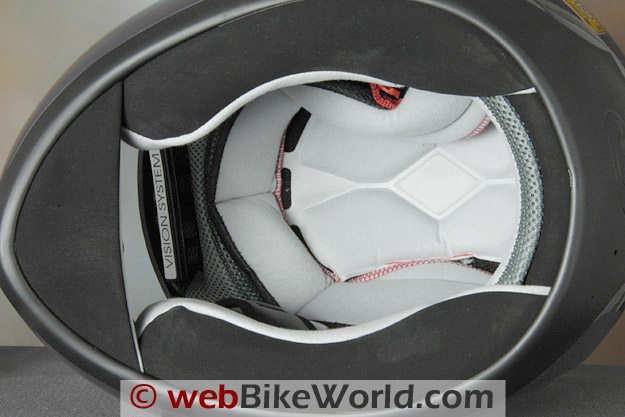
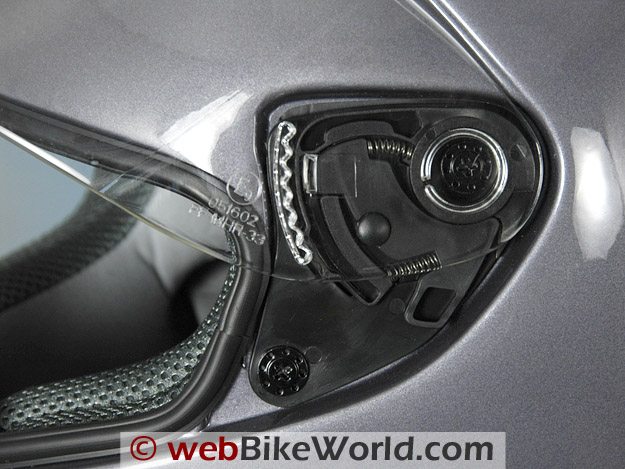
Reevu MSX1 Face Shield
I discussed the face shield fit to the eye port gasket in the “Quality” section above. The face shield also has excellent optical properties and it is labeled as meeting VESC-8 impact standards and it has a marking that reads “FF-MHR-33”.
I’m not sure if that is an impact standard or not; I did some searching but came up empty, so perhaps our readers can help.
The face shield operates smoothly and it has 7 full detents, the first of which is a small opening for defogging. Each detent has a good feel and there is no observed lateral flex in the face shield as it is moved up or down.
The lifting tab in the lower left-hand corner is slightly smaller than average and may take a second or so longer than normal to locate, but it works without problems.
The face shield removal system is very easy to use; lift the shield all the way and pull down on the lever and the shield comes right out.
It is held in place by a small molded tab on the circular rotating post and another tab that slides under the moving lever that holds it in place. See the video for a demonstration.
The eye port gasket appears to be well made and it’s perfectly placed and aligned in the eye port, but it doesn’t quite feel thick enough to make a tight seal as described above. This could potentially be an easy running production fix by Reevu, by using a different type of gasket or possibly by tightening up the tolerances on the face shield placement.
In all fairness though, this is a very minor issue and only presents itself because it’s really the only slight flaw in what is overall an outstanding design and execution.
[UPDATE: Reevu said there is 4 mm of adjustment in the face shield rotating mechanism plates, so we’ll experiment with that to see if it tightens up the fit and will report back.]The weather is currently too warm to evaluate the anti-fog properties of the face shield, but I’ll put in a plug here for the easy-to-use and very inexpensive Clarity Defog It (review) anti-fog coating that overcomes any fogging problem.
The visibility out the eye port is average, with no problems to report in the vertical or horizontal planes.

Overall, the Reevu MSX1 has an excellent face shield design that is easy to use; the face shield has excellent quality optics and it is easy to remove and replace and it feels sturdy. Only the slight gap between the face shield and the eye port gasket lowers the score slightly.
Score: I’ll give the overall face shield and its operating system an “Excellent”.
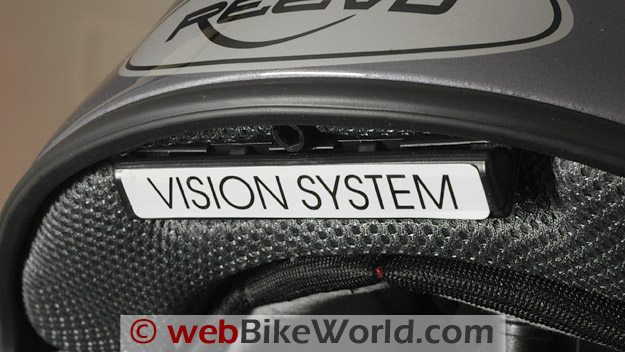
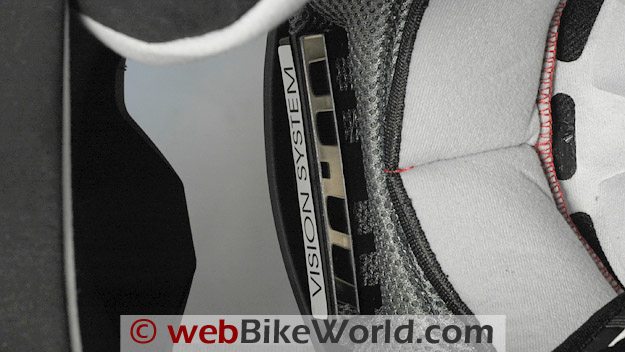
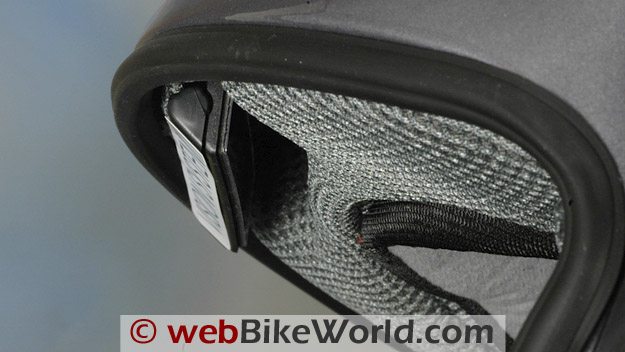
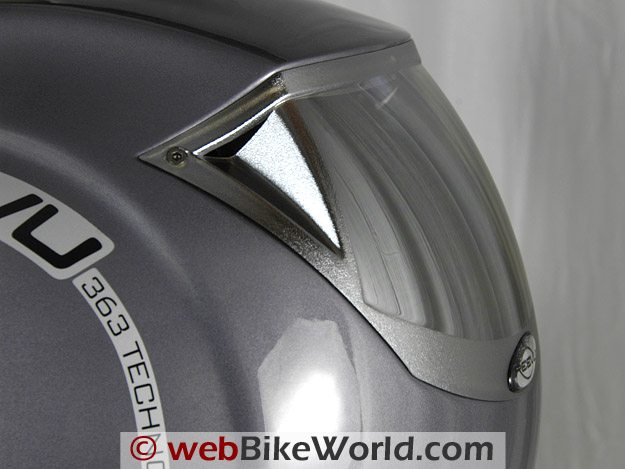
Reevu MSX1 Rear View Mirror System
Let’s get to what is certainly the most interesting feature of the MSX1 — the rear view mirror system. What started as an interesting concept back in 2004 at first seemed to fade away but is now a reality.
The mechanics of the system remain mysterious and that’s probably the way Reevu would like to keep it, although the system does have an international patent granted in 2000 (here).
We removed the rear cover to take a peek inside, but it was too difficult to photograph due to the series of obliquely mounted mirrors, and we didn’t want to give away all the secrets.
The rear view system is located inside of a tunnel over the top of the EPS foam liner. The floor of the tunnel is covered with an anti-reflective fabric and the top is a series of polycarbonate moldings coated with a mirrored finish.
The rear of the helmet is a large mirrored cover, designed to mute headlights at night but provide enough transparency to allow the system to work.
There are no batteries to replace; the system is entirely mechanical. The front of the rear view system consists of a mirrored polycarbonate surface that has a viewing area of approximately 87 mm long and about 17 mm tall.
This is the mirror that is located at the top of the eye port, out of the direct line of sight but available to the rider’s vision when looking upward.
The mirror on the 2010 version of the MSX1 is of much better quality than the original.
Also, the new mirror can be rotated back and forth and there’s a small hex screw that allows the entire front part of the rear view mirror to move up and down to custom-fit it to the rider’s preference.
It has a limited range of movement in both directions, but it should be enough for any rider to get the mirror situated to the optimal position.
To see the rear view, the rider must look upwards. The mirror is not in the direct line of sight, so the rider makes a deliberate effort to look at it, and there is also a parallax issue when doing so.
The eyes can’t resolve the complete mirror width in the short distance, so the ends of the mirror on both sides appear duplicated.
This isn’t a problem, just something to be noted and illustrates that it is not like looking into the rear view mirror in a car (although parallax issues can arise there also).
The location of the mirror is correct, because it does not hang down too far into the rider’s line of sight and the mirror does not become a distraction when riding.
In fact, the rider must take care not to stare into the mirror for too long — eyes should be focused where the bike should go, not where it’s already been!
It does take a bit of adjusting and a small amount of time to get used to the new view; I had to adjust the mirror once or twice to find the optimal position that allowed me to get the rear view I was looking for without a lot of head movement.
The first time I used it, I found that I had to move my head up and down and side to side to see, but some judicious mirror adjusting made it much better.
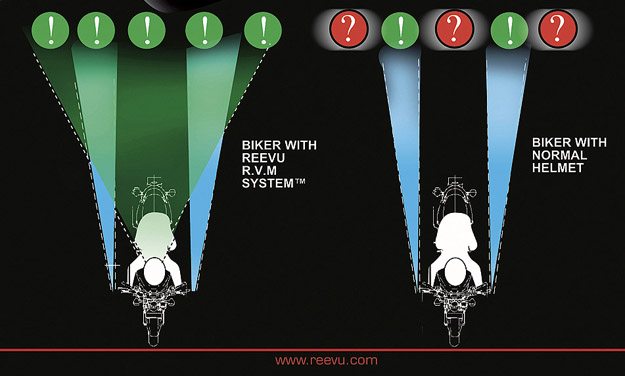
Using the Reevu Rear View Mirror
The view out back of the Reevu MSX1 is narrow in the vertical plane, due to the narrow vertical height of the mirror.
Depending upon how the mirror is adjusted for the individual rider, the view in back can range from directly behind the motorcycle to about the horizon, or from approximately 6 meters behind the motorcycle to well above the horizon, or at least enough to see behind as far back as possible.
Moving the head up and down just slightly can also bring both fields of view into the line of sight, so practicing this is important.
We estimated that the width of the view is about 2 meters on either side of a standard U.S. two-lane road, which is approximately 24 feet.
So the width of the view starts at approximately 36 feet (11 meters) wide at about 6 meters behind the motorcycle out to an angle that shows virtually the entire rear, but at a narrow vertical distance as described.
It’s also important to note that the image in the mirror is not a perfectly clear, perfectly lighted view like you’d get from looking at a rear view mirror in a car.
It’s about 2-3 stops darker than the ambient light, due to the mirrored rear cover and the deliberate use of tinted material to mute headlights at night. Also, the surface of the polycarbonate isn’t as perfectly smooth as a glass mirror, so there is a slight distortion in the image.
Because the mirror is out of the direct line of sight, headlights at night are not a problem, it’s similar to looking into the rear view mirror when driving a car.
It’s a revelation to glance up in the top of the helmet and see what’s going on behind.
I still use the rear view mirrors on the motorcycle itself, because one can never have too much situational awareness, but even the best rear view mirrors will not give you a 180-degree image of directly behind the bike — the view that you get with the Reevu.
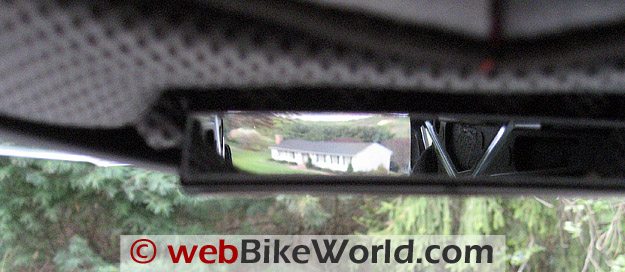
We were able to roughly illustrate how the rear view mirror system works in the video, but it’s very difficult to duplicate the view with a camera (photo above).
The photograph above was taken of a house across the street, approximately 125 meters distant.
Since the house is white and the background is neutral, it shows on the mirror, although the width of the image is shorter than it is when wearing the helmet, due to the constriction inside the helmet for the camera.
Overall, the Reevu rear view mirror system is an outstanding feature that has a real safety factor for motorcycle use.
Reevu MSX1 Ventilation and Air Flow
The mechanism and the extra space required on top of the helmet for the rear view mirror system must have created quite a puzzle for the designers to solve as they also fit the intake and exhaust vents on the MSX1.
But the tunnel itself acts as a Venturi that is supposed to pull air up through the helmet and out the back.
Whether or not the dust and pollen in the air that is flowing through the tunnel will affect the reflectivity of the mirror system is unknown.
The helmet has a chin vent and top vent with small openings. The chin vent does not have a passageway through the chin bar, but directs the air on to the back of the small breath guard.
A small volume of air can be felt when the chin vent is open.
The top vent also has a very small opening and I can’t find a direct inlet through the EPS foam under the helmet liner, so I assume the air enters the helmet, travels over the top of the EPS and out the back.
Two exhaust ports are cleverly hidden on either side of the mirrored polycarbonate in the rear of the helmet that hides the rear view mirror system.
So overall the ventilation on the Reevu MSX1 is average to below average. This hasn’t been a problem so far during Spring weather and temperatures.

The chin and top vents are covered by small sliders that open and close with a push. They’re a bit difficult to operate because they don’t provide a good gripping surface, so the best method is to use a couple of fingers to push them open or closed.
Score: Overall, the venting system on the Reevu MSX1 is below average, but this is somewhat overcome by the other features and the utility of the helmet. I’ll give the MSX1 a “Neutral” rating for ventilation.
Reevu MSX1 Sound Levels
The smaller vents and the overall smooth shape of the MSX1 apparently contribute to the low noise levels; we think the helmet is quieter than average in a variety of riding conditions.
The internal padding and shallow ear pockets probably contribute to this also, as they form a snug fit.
The high quality material used on the bottom of the helmet liner covers the thick neck padding and the helmet also has a nice chin curtain that helps keep noise levels down.
The design around the bottom of the helmet also helps reduce turbulence-induced noise in that area and the helmet is quieter than average also when riding behind a selection of motorcycles with windscreens.



Note that our helmet evaluations are a combined effort of several riders over time on different types of motorcycles with and without windscreens.
Evaluators wear correctly fitted, high quality ear plugs (even when evaluating motorcycle intercom systems).
Always protect your hearing when riding a motorcycle. See the wBW Earplug Reviews for more information on choosing and wearing earplugs.
Note also that perceived noise levels will vary, depending on the individual.
Noise can be caused by many factors, including helmet fit, the type of motorcycle and windscreen, wind speed and direction and even the rider’s clothing.
For more information on helmet noise, visit the wBW Motorcycle Helmet Noise page.
Score: I’ll give the Reevu MSX1 an “Excellent” score for low noise in all conditions.
Helmet Weight
The size XL Reevu MSX1 shown here weighs a hefty 1839 grams (4.0 lbs., 7/8 oz.). This isn’t the heaviest helmet we’ve reviewed by any means, but it puts it in flip-up weight territory.
Some of the other helmets in this weight range, all flip-ups, include the SCHUBERTH C2 (review) at 1827 grams; the Zeus ZS-3000B (review) at 1842 grams and the Nolan N102 (review) at 1850 grams.
For comparison, other non-flip-up helmets in size XL are the Bell Sprint at 1688 g; the HJC CL-16 at 1702 g and the HJC CL-14 at 1704 grams.
Obviously, the internal rear view mirror system accounts for a lot of weight in the Reevu MSX1, but the helmet does feel nicely balanced, all things considered.
Score: I’ll give the MSX1 a “Neutral” rating for its weight and balance.
Miscellaneous
The MSX1 has a micro-adjusting style ratchet chin strap on this ECE version, despite the Reevu product information on their website claiming that the helmet uses the double D-ring system.
The Reevu MSX1 is also available in the U.S. as a DOT version.
The helmet uses two shells with three different liner sizes for each head size.
The XS, S and M use the medium shell and the L, XL and XXL use the larger shell. Reevu said that both the front face shield and rear mirror cover is available in clear, smoke or mirrored as options.
The MSX1 has a lifetime warranty on the shell which is an advanced “Trifibre” composite. The parts are warranted for 5 years for breakage.
The liners are considered a consumable and carry a 12 month defect and wear policy. Parts are made in Europe and Asia, as is the assembly.



Conclusion
The Reevu MSX1 rear view motorcycle helmet system is both unique and revolutionary.
While it does have some limitations with regards to weight and the less-than-perfect rear view, it’s certainly an interesting product that will hopefully make an impact on the evolution of the motorcycle helmet and motorcycle safety.
| wBW Review: Reevu MSX1 Helmet | |
|---|---|
| Manufacturer: Reevu | List Price (2010): $399.99 at RevZilla |
| Colors: Black, gray, light gray. | Made In: Europe and Asia. |
| Sizes: XS-2XL. Shell Sizes: 2 | Review Date: April 2010
Note: Item was provided by a retailer, distributor or manufacturer with these Terms and Conditions.
|
|
Rating Scale is subjective: Unacceptable, Poor, Neutral, Very Good, Excellent, Outstanding.
|
|
Owner Comments and Feedback
See details on submitting comments.
From “R.L.” (06/2011): “Just bought a graphic lid with tinted visor. I was a bit dubious at first but when I tried it on I was shocked.
If you leave the visor open or keep the clear visor on, you can see behind you with out any real problems but when using a tinted visor the mirror inside seems to light up and you have perfect vision.
I did a round trip of 400 miles on the weekend and it was so comfortable and quiet ( i sometimes suffer from headaches when wearing a helmet).
This Helmet has a lot of advantages and the only disadvantage was that due to this being the first rear view helmet I’ve ever tried it took me a while to get used to having a mirror and being able to see behind.
I normally spend less than £100 on helmets but I would recommend this helmet to everyone that rides bikes and its well worth spending that little bit more.”
From “J.C.” (5/10): “I have had a new silver Reevu helmet since January 2010 — the same model you have just reviewed.
Just a quick question: did you not find that when in a slightly more sporty position your head is inclined such that you end up seeing mostly sky rather than what’s behind you?
Unless I purposefully straighten myself up from my BMW K1300S then I really don’t have a very useable image. On my BMW R1200GS it’s fine because of the naturally more upright riding position.
My view after 5 months with the Reevu is it cannot be recommended without a strong caveat for Sports riders. For riders of standards and dual sports bikes the Reevu is excellent. Would be interested to know if you noticed this characteristic of the helmet.
Love your site and avidly read all the reviews. You are a credit to motorcycling and the internet.”
Editor’s Reply: Although we did not try it on a full-on sportbike, with a correctly fitted helmet the mirror has quite a bit of range of view with sport-touring (leaned forward) riding positions.
It doesn’t take much movement to get the view of what’s behind, but even on a touring bike it may take some minor head movements to align the mirror and this happens almost intuitively with practice.
The mirror system is obviously not designed to give a complete 100% view of everything behind the bike in all situations at all times; occasionally it takes some head movement to get the scope or range of the view behind.
The mirror may also need some slight adjustment to find the best compromise for rear view for the specific rider, helmet fit and motorcycle type.
Here’s a photo from Reevu of a racer using the helmet:
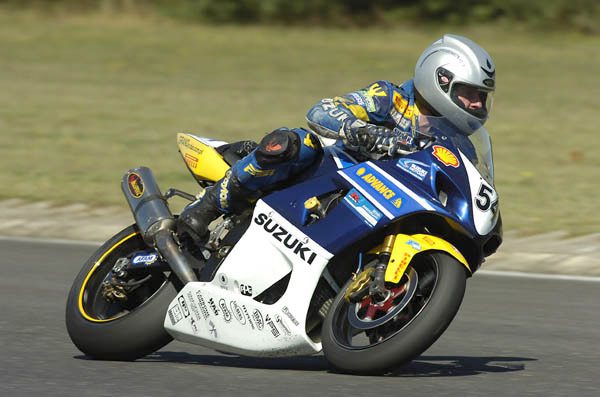

From “J” (4/10): “I purchased one black Reevu in Singapore in 2006, I found the fit and finish quite nice. However the weight and lack of good ventilation made it difficult to operate with in the slow traffic and heat of Singapore.
So since 2007 it has been in my storage in the USA and used in winter, and cool days when returning for vacations. Operationally for the rearview system it really provides a good view of behind you.
I use it to check blind spots (to the rear quarters), however, you must remember you actually look the opposite way when looking the direction you want to check.
I did get used to it quite well and enjoyed not trying to crane my neck around to look around and no mirror twitching to check mirrors often. Overall I like the helmet enough not to get rid of it, and only wish there were some replacement back clear covers. If not careful it gets scratched up.”
Editor’s Note: The new version described in this review is available with accessory rear covers.


